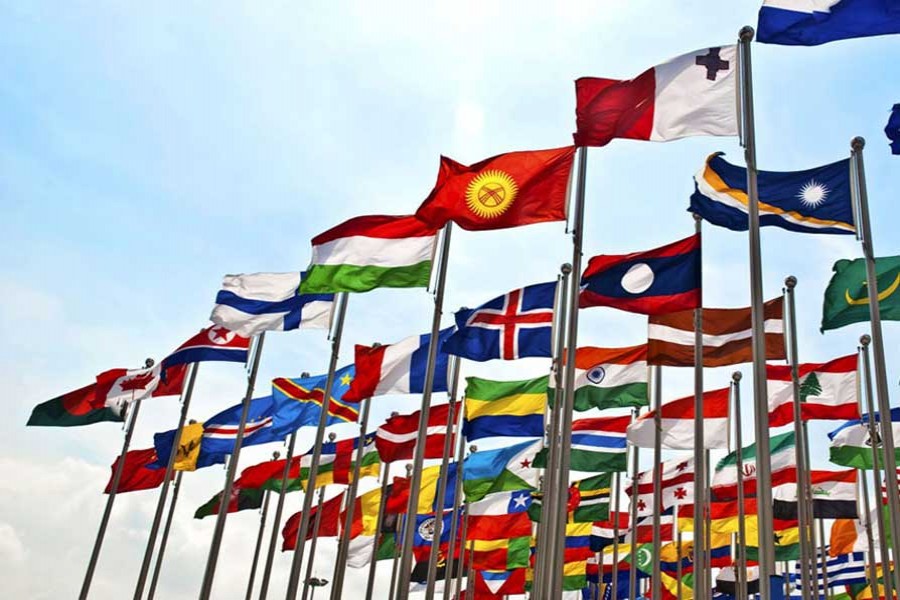Multilateralism, a rules-based and international system, emerged and developed as a key element of world politics and economics after the World War II. Multilateralism refers to mutual collaboration and engagements of world governments to achieve something cherished or to manage markets and economic activity for shared benefits. It has been the core principle of post-WWII global governance architecture that supported reconstruction and prosperity for nations - large and small.
But looking at multilateralism at the advent of 2019, it is worrying that nationalistic leanings and identity politics are threatening it. Scott Morris, Director of the US Development Policy Initiative, in his article 'The Incredible Shrinking US Multilateralism' has observed: "The big trends in multilateralism included a hardening of the Trump administration's opposition to international cooperation, a concomitant increase in China's efforts to influence bodies like the United Nations, and worrying signs of European splits over the value of internationalism." (Centre for Global Development, February 13, 2018).
Robust multilateralism allowed war ravaged Europe to strive for peace and economic prosperity. Also evading many crises globally, multilateral trade guidelines have sustained stable and fairly expected trade flows supporting economic growth and development.
Nevertheless, during 2017-2018 multilateralism has experienced increasing pressure and the outlook for it in the coming years seems to be gloomy. Richard Gowan in his article in World Politics Review (December 31, 2018) has commented, "The United Nations and other international organisations face two major strategic challenges, plus multiple subsidiary crises, over the next year. The main challenges are an intensification of competition between the U.S. and China in multilateral forums, and a rapid deterioration of the once-sturdy nuclear arms control framework."
US President Donald Trump has been averse to multilateralism while advancing his signature "America First" policy. Trump seems to choose a way in which bilateral arrangements supersede the current multilateral rule-based order. In his second address to the UN's annual gathering in September 2018, Trump bluntly said that he rejects the philosophy of globalism, and firmly holds the doctrine of patriotism.
It is an irony that President Trump is rejecting the principle of multilateralism which was promoted by the US in the first place as the basis for world peace and prosperity. It was the leadership of President Franklin Roosevelt that fashioned the United Nations, the most inclusive multilateral organisation. In the spirit of multilateralism, his successor President Harry Truman signed multi-billion dollar foreign aid programme under the 'Marshall Plan' to rebuild war-torn Europe. President Kennedy in his first speech at the UN General Assembly in 1961 assured cooperation to close the gap between developed and underdeveloped countries.
Thus, it is disappointing that President Trump has rejected the milestone Paris climate change deal of December 2015, disowned the Iran nuclear deal and left the UN Human Rights Council. The Trump administration has supported fewer multilateral institutions and programmes than any other US Presidents did and has stopped supporting important multidimensional collaboration such as the International Fund for Agricultural Development (IFAD) and Global Food and Security Programme.
In the latest move, the US has also formally withdrawn from the United Nations Educational, Scientific and Cultural Organisation (UNESCO) on the first day of 2019 -- another setback to UNESCO and multilateralism.
The multilateral trade groupings are also under intense pressure. The G20 Summit held in 2018 avoided strong phrasing on protectionism -- an unpredictable signal for the future of free global trade. Australian PM Scott Morrison has alerted against "protectionist barriers" and said: "More than a billion people have been lifted out of extreme poverty since 1991 in large part because of the jobs and access to affordable consumer goods that free trade has enabled."
At the opening annual meeting of the UN General Assembly in September 2018, UN Secretary-General Antonio Guterres said, "Multilateralism is under attack from many different directions precisely when we need it most."
Of late, rejecting Trump's criticism of multilateralism, Chancellor Angela Merkel in her 2019 New Year address reiterated: Germany must "stand fast, argue and fight for our own convictions" and assume greater responsibilities at a time when multilateralism is coming under intense pressure." She cautioned that "global challenges including climate change, immigration and the fight against terrorism could not be solved by countries going it alone."
The US which took the most vital role in the formation of multilateral institutions and cooperation after WWII, and remained a de facto guarantor, now under President Trump is undermining and retreating from its policy and even confronting the adherents of multilateralism.
We may conclude with Kemal Dervis who in his article 'Can multilateralism survive?' said, "Given the need for inclusive cooperation, adapting and strengthening rules-based and ethical global governance system is crucial to securing long-term peace and progress. Given America's continuing 'size', it is critical for the world as a whole that the US is fully engaged and again becomes a global-governance leader for the digital age." (Project Syndicate, July 20, 2018). In fact, multilateral world order can effectively carry on and sustain peace and prosperity when the US - the leading global actor is fully engaged in supporting multilateralism unconditionally.
Dr. Kamal Uddin Ahmed is a former Professor and Chairman, Department of Political Science, University of Dhaka. kamal112au@yahoo.com


